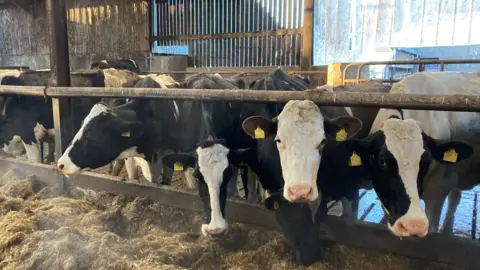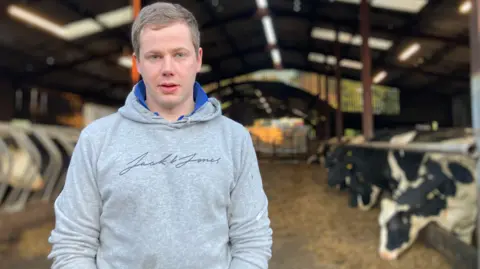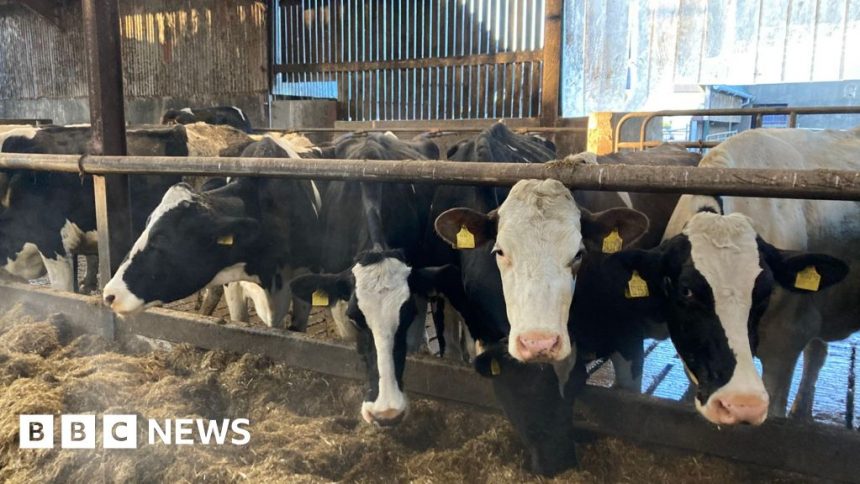‘Fundamental change’ needed in approach to bovine TB
 BBC
BBCA wildlife cull is not the first resort for tackling bovine TB in Northern Ireland, the chief veterinary officer has said.
But Brian Dooher believes a specifically targeted cull could follow a trap, vaccinate and release programme in areas where the disease has high prevalence.
His review of how bovine TB is controlled here was commissioned by the Agriculture, Environment and Rural Affairs Minister Andrew Muir but is not a policy document.
Presenting his findings to the Daera committee at Stormont, Mr. Dooher said “one size does not fit all” and a “fundamental change” in approach was required.
He added that bovine TB needed “to be made visible again as the infectious, zoonotic, potentially fatal disease that it is with clear economic impacts”.
But his review is not a final decision on the way forward.
The disease has cost the Department of Agriculture, Environment and Rural Affairs (Daera) £55.7m in the year 2023/24.
Almost two-thirds of that total, £36.5m, was paid in compensation to farmers for the removal of animals.
The cumulative cost of the bovine TB programme in the last 20 years is about £750m.
The chief veterinary officer warned that, given the current trajectory, spend on the programme alone may be expected to exceed £1bn over the next 15 years.
Mr Muir told the committee that it was his hope the report marked a “turning point”, saying “the status quo is not an option”.
In October 2023, a court rescinded an order by the former minister Edwin Poots for a wildlife cull of badgers.
‘A mountain pulling us down’

Ross Beattie’s family dairy farm, situated between Ballymoney and Kilrea, has been badly affected by bovine TB since 2020.
“We’re been shut, closed down in the herd since Covid came in 2020.
“We’re majorly overstocked. This has put a lot of added workload on to us.
“We’ve lost over 200 cattle in that period of time. These cattle have had to go and we’ve lost generations of breeding out of our cattle.”
Mr Beattie said less than 15% of those cattle had TB lesions.
“We only milk 120 here on the farm. We’re struggling to keep numbers going for it. We’re struggling as a business and we can’t see any way out of this.
“This has a huge financial strain on our business. We are a dairy farm primarily. We sell milk to the public and now, with reducing the number of cows on our farm after losing so many, we cannot keep the milk pool available that should be there.
“We’re now financially at half the value of the milk going that we had pre-2020 because our cow numbers are so low.”
He added that “breeding had been wiped out” on his farm.
“My father-in-law has had 40 years between him and his father before that breeding cattle up and that has been completely destroyed.
“Emotionally this has been a disaster. My father-in-law couldn’t actually stand beside me today to tell you the story because he has just been in stress over the head of this. He feels himself getting lower.
“He sees good quality stock that we do try to keep, he has seen generations of breeding disappear overnight with continuous testing.
“Mentally it’s quite soul-destroying. You see young cows going, having to leave the farm. There should be no reason for why that is. TB is causing us huge stress. We just can’t function as a business.”
He added that a number of farms in the area were affected.
“We’re a TB area hotpot and it has to boil down to wildlife within this area. There’s no nose-to-nose contact within our herd with any other herd. We do our bit for the environment… but I just keep feeling like this TB mountain is pulling us down.”
Mr Beattie believes “a wildlife intervention within certain areas” is the only way to move forward.





